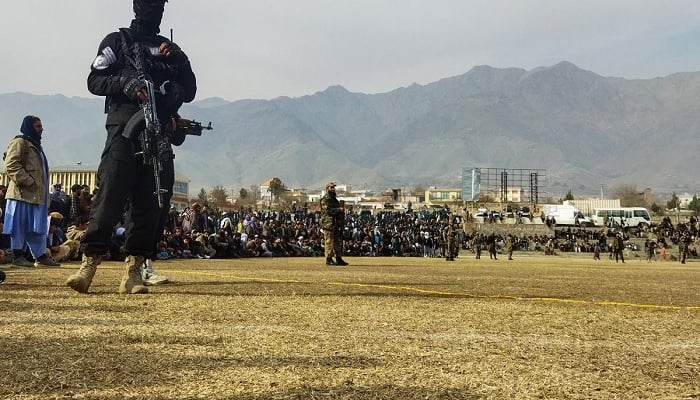Public Executions Return to Afghanistan Under the Taliban
On Friday, Afghanistan saw its highest number of public executions in a single day since the Taliban regained control. Four men were executed, a stark reminder of the regime’s strict interpretation of law and order.
The executions took place at sports stadiums across three provinces, raising the total number of public executions since the Taliban resumed power in 2021 to ten, according to an AFP count.
During their first rule between 1996 and 2001, the Taliban frequently conducted public executions in stadiums, and this practice is reemerging under their current governance. Witnesses reported that two men were shot multiple times by male relatives of their victims in front of a crowd in Qala-i-Naw, located in Badghis province. "They were made to sit with their backs turned to us, and the victim’s relatives stood behind them and fired," described Mohammad Iqbal Rahimyar, a 48-year-old attendee.
The Supreme Court stated that the men had received "retaliatory punishment" following thorough reviews of their cases for murdering others. The families of the victims opted not to exercise leniency, underscoring the grim nature of the punishment. One onlooker, a 35-year-old named Zabihullah, expressed his views outside the stadium, saying, "If the victim’s family had chosen to forgive, it would have been better. But if not, it’s God’s will, and it must be enforced."
Invitations to attend the executions were circulated in official announcements on Thursday. The Supreme Court confirmed that a third man was executed in Zaranj, Nimroz province, and another in Farah city.
"This demonstrates the strength and political stance of the Islamic Emirate, and I find that encouraging," stated Javid, a 30-year-old spectator, referencing the Taliban’s official name. Amnesty International has condemned the Taliban’s use of public executions, labeling it a "blatant violation of human dignity."
Retaliatory Justice
The last execution prior to this event occurred in November 2024, when a convicted murderer was shot in front of thousands, including high-ranking Taliban officials, in Gardez, the capital of Paktia province. Under the Taliban’s regime, corporal punishments, particularly flogging, have been routinely enforced for various offenses, including theft and adultery.
All orders for executions are sanctioned by the Taliban’s hidden Supreme Leader, Hibatullah Akhundzada, who resides in Kandahar. In 2022, he mandated that judges strictly enforce the Taliban’s interpretation of Islamic law, which incorporates "eye-for-an-eye" consequences, allowing for capital punishment in murder cases.
Law and order are foundational to the Taliban’s ideology, stemming from a civil war that erupted following the Soviet withdrawal from Afghanistan in 1989. A chilling moment from their earlier reign exemplifies their brutal enforcement of law—a 1999 incident where a woman, accused of killing her husband, was executed in a Kabul stadium while clad in a burqa.
Both the United Nations and various human rights organizations, such as Amnesty International, have condemned the Taliban’s implementation of corporal punishment and capital punishment. Amnesty’s reports indicate that Afghanistan remains among the countries where death sentences are issued without adherence to international fair trial standards. In 2024, 1,518 executions were documented globally, excluding the thousands believed to have occurred in China, the leading executor of capital punishment in the world, according to Amnesty’s annual report.





